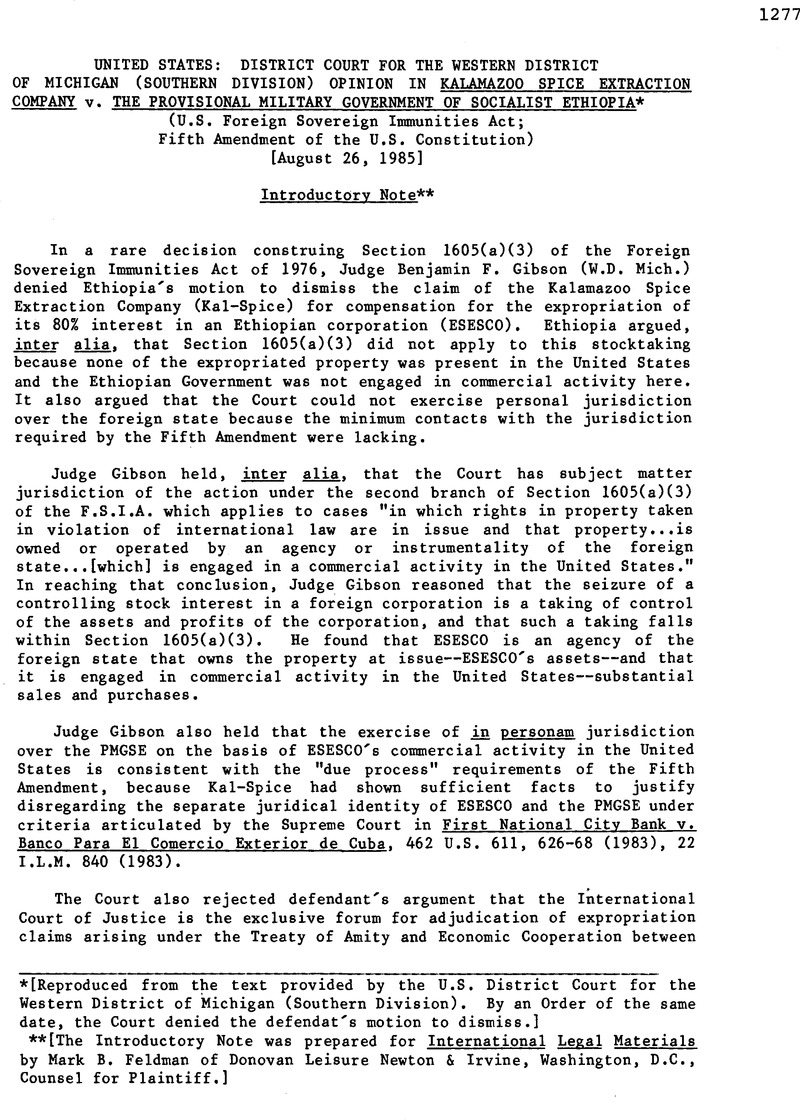No CrossRef data available.
Published online by Cambridge University Press: 20 March 2017

* [Reproduced from the text provided by the U.S. District Court for the Western District of Michigan (Southern Division). By an Order of the same date, the Court denied the defendat's motion to dismiss.]
** [The Introductory Note was prepared for International Legal Materials by Feldman, Mark B. of Donovan Leisure Newton & Irvine, Washington, D.C., Counsel for Plaintiff.]Google Scholar
1 An Qleoreain is a semi-processed extract from a raw apica. See Complaint 19.
2 The “foreign state” referred to in section 1330 and elsewhere in tha FSIA is defined in section 1603 as follows:
S 1603. Definitions
For purposes of this chapter––
(a) A “foreign state,” except as used in section 1608 of this title, includes a political subdivision of a foreign state or an agency or instrumentality of a foreign state as defined in subsection (b).
(b) An “agency or instrumentality of a foreign state” means any entity––
(1) which is a separate legal person, corporate or otherwise and
(2) which is an organ of a foreign state or political subdivision thereof, or a majority of whose shares or other ownership interest is owned by a foreign state or political subdivision thereof, and
(3) which is neither a citizen of a State of the United States as defined in section 1332(c) and (d) of this title, nor created under the laws of any third country.
Because the PMGSE owns fifty-one percent of BSESCO, section 1603(a) and (b)(2) provide that BSESCO ia considered a “foreign state” for purposes of interpretation of section 1605.
3 See generally Kahale & Vega, Immunity and Jurisdiction: Toward a Uniform Body of Law in Actions Against Foreign States, 18 Col. J. Transnat'l L. 211, 252-256.
4 The Court does not intend to rule at this point whether the PMGSE's expropriation of a majority of the stock of ESESCO, as a matter of law, amounts to a de facto taking of the physical assets of ESESCO. The Court.is merely noting the allegations made in KAL-SPICE'S complaint.
5 Canadian Overseas Ores, Ltd. v. Companla de Acero, 528 F. Supp. 1337 (S.D.N.xV 1982), aff'd, 727 F.2d 274 (2d Cir. 1984), is not to the contrary. That case did not involve an expropriation but the simple repudiation of a contractual obligation. 528 F. Supp. at 1346-47. In this case, no one disputes that the PMGSE expropriated some kind of property, whether stock or assets.
6 see also Kahale t Vega, supra note 3, at 253 (noting that the requirement that there be a violation of international law “in affect merges the substantive cause of action with the jurisdictional issue”).
7 See supra note 2.
8 The House Report on the FSIA indicates that Congress intended section 1330(b) to, in effect, serve as a Federal long-arm statute over foreign states. H. R. Rep. No. 1487, 94th Cong., 2d Sess. 13, reprinted in 1976 U.S. Code Cong. & Ad. News 6612.